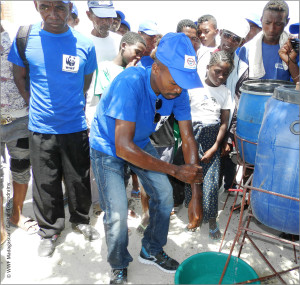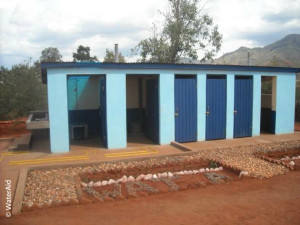 Well-maintained toilets can greatly improve sanitation in rural communities.
Well-maintained toilets can greatly improve sanitation in rural communities. Would you rather have a mobile phone, a television or a toilet? Before you choose, think about this: only one of these three is likely to save your life.
By Gaëtan Tovondrainy, WWF Projects Officer, Mahafaly Landscape
Globally each day an estimated 989 children die from diarrhea largely caused by a lack of access to safe water, sanitation, and hygiene.
That is like two full airplanes of children crashing without survivors every single day. WaterAid estimates that 4,000 Malagasy children die every year from diarrhoea caused by unsafe water and poor sanitation.
In fact, Madagascar continues to be one of the countries in the world with the poorest access to toilets, particularly in rural areas where, whether because of habit, tradition or a lack of resources, just 7.5% of people have access to a toilet.
In many areas of Southern Madagascar, relieving yourself in a confined area, such as a closed toilet, is seen as culturally taboo; instead people will defecate in the sea or on beaches with disastrous consequences on people’s health.
 Demonstrating proper hand-washing technique.
Demonstrating proper hand-washing technique. WWF Madagascar has been partnering with the Ministry of Education, ABC Domino – a Madagascar-based humanitarian association promoting education – , Diorano WASH – a platform promoting WASH (Water, Sanitation and Hygiene) activities – and local communities to help improve awareness of the importance of sanitation and encourage more people to use toilets.
The community in Beheloke came together last November to celebrate World Toilet Day.
Advocacy efforts by local authorities, done in partnership with the communities, are not just about using toilets, but focus on more general messages about the importance of cleanliness for health and safety. These messages are especially important in a region which suffers from a sustained drought each year between April and November, and where hygiene conditions rapidly worsen during the dry season, when access to water is limited.
The local coordinator of the regional Diorano WASH program explains why the event was held in Beheloke, “We chose Beheloke because the rate of people using latrines here is very low. This celebration is above all an awareness campaign for the population.”
“We must understand that unsanitary conditions caused by poor toilet habits have a direct impact on our health. The flies move back and forth between our waste and our food if we do not maintain a healthy environment. The water can become contaminated and make our children sick. That’s why clean hands and using latrines is a priority.”
 Newly built latrines in a Malagasy school yard.
Newly built latrines in a Malagasy school yard. The local community was enthusiastic about the event and receptive to the message that cleanliness is important.
“We asked the blessing of the spirits on the celebration of this World Toilet Day,” says Hazomanga, a mother from a village close to Beheloke who was there to support the event. “So the toilets we have built, the hand washing devices that we have made and the ceremony were blessed by the ancestors.”
Open defecation is common in much of Madagascar and also much of the world. It is a global problem that requires a global solution. The world’s nations recently adopted a set of 17 Sustainable Development Goals, creating a development agenda to improve the planet in critical areas by 2030. Goal #6 is to ensure that everyone has access to clean water and sanitation.
As WWF’s Domoina Rakotomalala, Landscape Leader for the southwestern Mahafaly Landscape, explains, health and the environment are tightly linked, “Development and environment-related objectives are connected. To make progress towards our environmental goals, you have to care about the people living in the area. By helping the local people to improve access to safe drinking water and promoting hygienic practices such as hand washing with soap and the use of toilets, WWF helps to build healthy and active local societies who can take care of their livelihoods and are willing to sustainably use the natural resources.”

